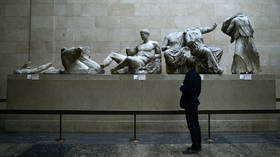Museums must not bow to the woke’s sanitised view of history

The British Museum is facing new calls from Greece to return the Elgin marbles to Athens. The dispute highlights the growing demand for artefacts to be returned to their original countries – a trend that distorts history horribly.
The way the Greek government tells it, there are four burning issues facing the people in the cradle of democracy: climate change, immigration, the coronavirus pandemic and the nagging insistence that the British Museum returns the Elgin marbles.
Surely, there are more important issues than what’s on display at one of London’s biggest tourist attractions? Apparently not, according to Greek Prime Minister Kyriakos Mitsotakis, who has reiterated his nation’s demands for the return of the artefacts at a meeting with UK PM Boris Johnson this week.
However, he’s not just stamping his feet and making wild demands; Mitsotakis has raised the prospect of sending some of ancient Greece’s most priceless treasures on a rotational tour to the UK. Those antiquities on offer could include the bronze mask of Agamemnon and a large statue of Zeus or Poseidon that would be expected to attract crowds by the thousands if they went on show in London.
They’re all ours for a crowd-pulling super-show if – and here’s the if – the British Museum will just return its collection of marbles (taken from the Parthenon by Thomas Bruce, the seventh Earl of Elgin, in the early 1800s) for permanent display in Athens.
Before we reach for the packing tape, it’s worth bearing in mind the line from Roman poet Virgil, who as far back as 19BC, reminded readers of his epic ‘Aeneid’ to “beware Greeks bearing gifts”. Not that I’m questioning their motives, of course, but if Britain agrees to the return, then it sets a dangerous precedent.
There’s no doubt that the Greek PM is genuine in his desire to have the Elgin marbles returned. It would be a huge political win and lead to a public outpouring of celebration on par with Greece’s shock win in football’s 2004 European Championships. But it ain’t gonna happen.
Because what the Greeks choose to ignore is that the British Museum does actually own the marbles, having bought them from Lord Elgin. And no doubt, as is the way with museum curators, there is most probably a receipt tucked away at the back of a drawer in a dusty desk that can be waved in their faces if needed.
It might come to that. While Mitsotakis is eager to turn the restitution of the disputed artefacts into an inter-governmental conversation, BoJo has confirmed that as far as the UK is concerned, the discussion is one for the trustees of the British Museum. Which is one way of turning down the heat on the matter, but it also coincides with demands from Nigeria that the museum return its collection of Benin bronzes that were, it seems, looted from the country in the 19th century.
Only a cynic would suggest that the Greeks are fully aware of the Benin bronzes situation and the recently agreed return of one from Cambridge University and have chosen the timing of their latest claim to ramp up the pressure upon the British Museum. Coincidence, surely?
What they are choosing to ignore is the British Museum Act (BMA) 1963, which explicitly forbids restitution on most grounds unless in exceptional circumstances, such as looted Nazi treasure. This has turned out to be a handy and prescient piece of legislation to prevent claims for artefacts to be returned to their point of origin – which would empty not just the halls of the British Museum but other collections at the likes of South London’s Horniman Museum.
A High Court case in 2009 reinforced the powers of the BMA by determining the act could not be overridden by “moral obligation” but that hasn’t deterred the Greeks from playing the emotional card with personal appeals to BoJo to intervene, to which so far he has proved admirably resistant.
The UK government does seem to be offering some pushback on the woke concept that museums are places of shame, chock full of plunder from nations subjugated under former empires and ruled by colonial brutality.
It could certainly make its case more forcefully, however, so that trustees of places such as the British Museum aren’t left exposed to the trolling of statue topplers and the mob who would prefer their own, self-serving sanitised view of history.
In the case of the Elgin marbles, the museum makes the case that every year around 6 million visitors to London have free access to view the 80-metre section of frieze that once adorned the Parthenon in Athens. Meanwhile in Greece, another 7 million tourists pay to see the 50 metre-long section of decorative frieze in the on-site museum.
That’s a lot of people soaking up history from a true golden age thanks, in part, to the foresight of Thomas Bruce, who thought the artefacts worthy of a wider audience when he saw them back in the 19th century.
While the narrative around their removal from Greece and subsequent purchase by the British Museum may have changed over the years, there is no doubt that if they had been left among the ruins of the Acropolis high on the hill above Athens, fewer people would have been left slack-jawed at their beauty over the years.
The Greeks have made a generous offer in suggesting loaning treasures to the UK that have never left Greece in exchange for a permanent return of the Elgin marbles, but the British Museum’s response to PM Mitsotakis must be the same as earlier suitors: ‘Thanks, but no thanks.”
Like this story? Share it with a friend!
The statements, views and opinions expressed in this column are solely those of the author and do not necessarily represent those of RT.














